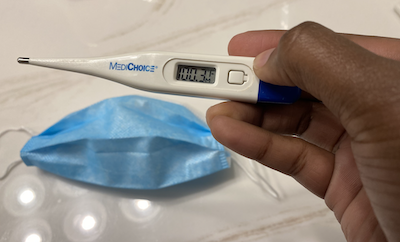Due to racial inequity in the health care system, black and brown people are suffering more during the COVID-19 pandemic. [Credit: Micaiah Kimble-Glover]
ATLANTA— On Sep 1, 2020, The New York Times published Roni Caryn Rabin’s article “Why the Coronavirus More Often Strikes Children of Color,” which addresses the divide in health care between white children and children of color, particularly as it’s related to the COVID-19 pandemic. In the piece, Rabin provides statistics that describe ways in which Black and Hispanic children “have been disproportionately affected by COVID-19,” especially those of lower socio-economic status. She contacted health care professionals like Dr. Alefiyah Malbari, an assistant professor of pediatrics at Icahn School of Medicine at Mount Sinai, to get statements about how the virus spreads and how it affects children of color.
Rabin’s article cites a number of credible sources to draw a clear conclusion that, in this case, also acts as a piece of advocacy journalism. The facts as presented by Rabin add up to one inescapable conclusion — that there is a bias against minority children in the application of health care in the United States. She brings these facts and personal stories from people the community to public attention to serve as a call-to-action. Even in a follow-up letter to her editor, Rabin notes that, “we must also look at ourselves to ensure that we are not perpetuating disparities in the hospital and in our clinics.” She wants her readership to recognize what is happening and to call out the implicit racism that permeates the United States’ health care system.
Since Rabin issued a call to action, she stepped away from unbiased journalism. Unbiased journalism lists the facts and information about an issue which aid readers in forming an opinion. However, Rabin’s piece implied that there should not be any other opinions on the issue of racial health care injustice because lives are at stake. Her article advocates for greater public responsibility and accountability, while also drawing on factual evidence to back up her claim.
Despite including a call-to-action, Rabin has not violated any journalism ethics codes. According to the core principles of journalism put forth by the Pew Research Center, journalists have an obligation to convey truth, must always remain loyal to the public, verify all facts and information, and remain as unbiased as possible by covering all aspects of a story. Rabin abided by these principles as she advocated and pushed for reformation in health care. Her obligation to the truth is also the obligation to hold people accountable. That is why she instructs people to do their part in stopping a dangerous cycle. Bringing this story to light is her form of being loyal to the public.
Rabin shares the views of some Black and Hispanic subjects as they navigate through health care systems. By verifying her facts and assertions, her story became more credible and reliable. Although her stance on bias in the health care system was clear, Rabin’s call-to-action was appropriate because the U.S. health care system faces an abridgment of human rights. And what would be the counterargument, given the facts at her disposal? That children of color do not deserve equal access to health care in the United States.
Forbes reports that 83% of people rely on news sites and journalists as their primary source for coronavirus news. Rabin is just one of many journalists tackling the spread of coronavirus information. Instead of just reporting numbers or symptoms, Rabin used her platform to illustrate the ways in which systemic racism takes a toll of the health of impoverished minorities during a global pandemic. She took her journalism a step further to call out and challenge Americans to pay attention to the structural racism during a time of crisis.


